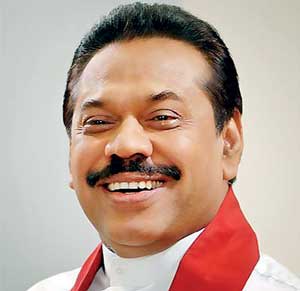Tuesday Feb 17, 2026
Tuesday Feb 17, 2026
Thursday, 21 July 2016 00:50 - - {{hitsCtrl.values.hits}}
Former President Mahinda Rajapaksa yesterday charged that the proposed Office of Missing Persons could betray the armed forces that saved the country from the three-decade war as it is empowered to work with little State oversight or control.
Issuing a statement Rajapaksa alleged the office would be one of several institutions to be established to deal with the past in terms of the United Nations Human Rights Council (UNHRC) resolutions which was co-sponsored by the Government. 
Outlining the content of the Office of Missing Persons bill which was tabled in Parliament, Rajapaksa claimed it has many provisions designed to persecute army personnel.
Rajapaksa argued the Office of Missing Persons will not be a part of local law enforcement and justice system, but an independent body incorporated by Parliament which gives its members the power to function outside the normal rules and regulations that guide state institutions.
He added even though it is described as an ‘office’ the proposed institution could act as a “tribunal for all practical purposes which can examine witnesses, issue summons and hold hearings.”
Rajapaksa said the officers of the Office of Missing Persons could enter any place without a warrant, at any time of day or night. He claimed those officers are authorised to seize any police station, prison or military installation, documents or objects they require for investigations.
Anyone who fails or refuses to cooperate with the officers may be punished for contempt of Court, Rajapaksa alleged.
The ex-President mentioned there is a clear possibility of deploying more representatives from western-funded NGOs as officers of the Office of Missing Persons and according to Section 21 of the bill they will be directly sponsored by foreign sources which Rajapaksa claimed were “western imperials.”
“Therefore the office will act independently within the country, but will be controlled by outsiders such as NGOs or Diaspora organisations. They could have agreements together. Members of the office can establish units and divisions and delegate their powers and functions as their own. They are also eligible to appoint or dismiss staff. The draft does not specify that staff should be Sri Lankans.”
In addition any interested local or foreign party could lodge complaints over missing persons in Sri Lanka and they need not be relations or friends of the missing person. Rajapaksa claimed this could open space for false complaints to be made.
“The bill says Government bodies at all levels including the armed forces and intelligence services are mandatorily required to render fullest assistance to the Office of Missing Persons and the provisions of the Official Secrets Act will not apply to the proposed institution,” he said in the statement, insisting it would be the “biggest betrayal” of the army.
Furthermore Rajapaksa claimed according to Section 12 (c) (iii) the office can accept any statement or material as evidence disregarding the criteria laid down in the Evidence Ordinance. He said it could create space for false evidence that could be used to punish armed forces personnel.
“The evidence and the information regarding the probes conducted by the office will not be covered under the provisions of the Right to Information Act, and then the office can conceal the truth from public. Even the Supreme Court cannot order any officer to submit information collected by them regarding the inquiries. Every member of the Parliament who voted for the bill will be held responsible by the people for betraying the country and the armed forces.”